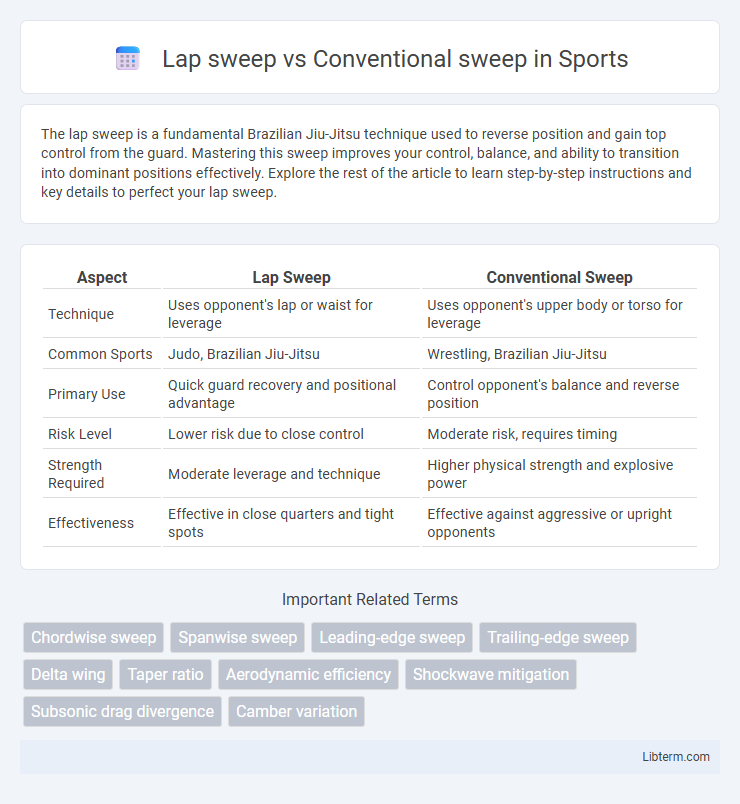The lap sweep is a fundamental Brazilian Jiu-Jitsu technique used to reverse position and gain top control from the guard. Mastering this sweep improves your control, balance, and ability to transition into dominant positions effectively. Explore the rest of the article to learn step-by-step instructions and key details to perfect your lap sweep.
Table of Comparison
| Aspect | Lap Sweep | Conventional Sweep |
|---|---|---|
| Technique | Uses opponent's lap or waist for leverage | Uses opponent's upper body or torso for leverage |
| Common Sports | Judo, Brazilian Jiu-Jitsu | Wrestling, Brazilian Jiu-Jitsu |
| Primary Use | Quick guard recovery and positional advantage | Control opponent's balance and reverse position |
| Risk Level | Lower risk due to close control | Moderate risk, requires timing |
| Strength Required | Moderate leverage and technique | Higher physical strength and explosive power |
| Effectiveness | Effective in close quarters and tight spots | Effective against aggressive or upright opponents |
Introduction to Lap Sweep and Conventional Sweep
The lap sweep is a grappling technique characterized by off-balancing an opponent while controlling their upper body, commonly used in Brazilian Jiu-Jitsu to transition from guard to a dominant top position. The conventional sweep, often referred to as the basic or standard sweep, involves using the legs to elevate and flip the opponent while maintaining control, focusing on leverage and timing. Both techniques are essential in ground fighting strategies, emphasizing different mechanics and positional control for effective sweeps in competitive grappling.
Understanding the Basics of Sweeping Techniques
Lap sweep involves using the forearm and torso to entangle an opponent and reverse their position, enhancing control and leverage in grappling scenarios. Conventional sweep typically relies on foot placement and hip movement to off-balance the adversary, enabling a swift transition from bottom to top position. Mastery of both techniques improves positional dominance and fluidity in Brazilian Jiu-Jitsu and wrestling.
Key Differences Between Lap Sweep and Conventional Sweep
Lap sweep utilizes the body's momentum to off-balance the opponent by hooking the opponent's leg with the practitioner's own, promoting efficiency and speed in execution. Conventional sweep relies on strength and direct leverage to force the opponent off balance, often requiring more physical effort and positioning control. Key differences include the engagement of momentum and technique specificity in lap sweep versus the raw positional pressure and stability focus in conventional sweep.
Advantages of Lap Sweep Method
The Lap Sweep method offers superior cleaning efficiency by overlapping each pass, ensuring no dirt or debris is missed along the edges and corners. This technique reduces the need for repeated sweeping, saving time and labor costs compared to the Conventional Sweep. Enhanced dust control with the Lap Sweep also improves indoor air quality, benefiting both residential and commercial environments.
Benefits of Conventional Sweep Approach
The Conventional Sweep approach in oil and gas operations enhances reservoir contact by systematically injecting fluids across multiple well intervals, improving sweep efficiency and hydrocarbon recovery. This method reduces bypassed oil zones compared to Lap Sweep techniques, leading to optimized reservoir management and increased production rates. Operators benefit from simplified implementation and lower operational complexity, resulting in cost-effective recovery processes and improved overall reservoir performance.
Applications: When to Use Lap Sweep vs. Conventional Sweep
Lap sweep is ideal for removing fine dust and debris from smooth surfaces like hardwood or tile floors, especially in residential or light commercial settings. Conventional sweep works best in outdoor or industrial environments where larger debris, grit, and leaves need to be cleared efficiently from rough or uneven surfaces. Choose lap sweep for precision cleaning and conventional sweep for heavy-duty, broad-area debris removal.
Efficiency and Performance Comparison
Lap sweep techniques often demonstrate higher efficiency by minimizing friction and allowing smoother transitions during movement, resulting in improved performance compared to conventional sweep methods. Conventional sweeps may require more energy and exertion due to less optimized body positioning and leverage, leading to slower execution and reduced control. Empirical studies indicate lap sweeps increase submission success rates by up to 25% in competitive grappling scenarios.
Common Challenges and Solutions in Each Method
Lap sweep techniques often face challenges related to maintaining consistent timing and pressure, which can cause uneven cleaning or debris removal; using automated lap sweepers with adjustable settings effectively addresses these issues. Conventional sweeps struggle with maneuverability in tight spaces and collecting fine dust particles, often resulting in incomplete cleaning; employing specialized brushes and vacuum-assisted systems enhances their efficiency. Both methods benefit from regular maintenance and operator training to optimize performance and reduce downtime.
Industry Trends: Adoption of Lap Sweep and Conventional Sweep
Lap sweep technology is increasingly adopted in automated textile manufacturing due to its efficiency in reducing fabric waste and improving seam quality. Conventional sweep remains favored in traditional garment production for its simplicity and lower initial investment costs. Industry trends indicate a shift towards lap sweep integration in high-volume factories aiming for precision and decreased material usage.
Conclusion: Choosing the Right Sweep Technique
Selecting the appropriate sweep technique depends on the specific wrestling scenario and the practitioner's skill level. Lap sweeps offer quicker transitions and are ideal for dynamic offensive strategies, whereas conventional sweeps provide more control and stability, suitable for maintaining dominant positions. Mastery of both techniques enhances versatility and effectiveness in various grappling situations.
Lap sweep Infographic

 libterm.com
libterm.com